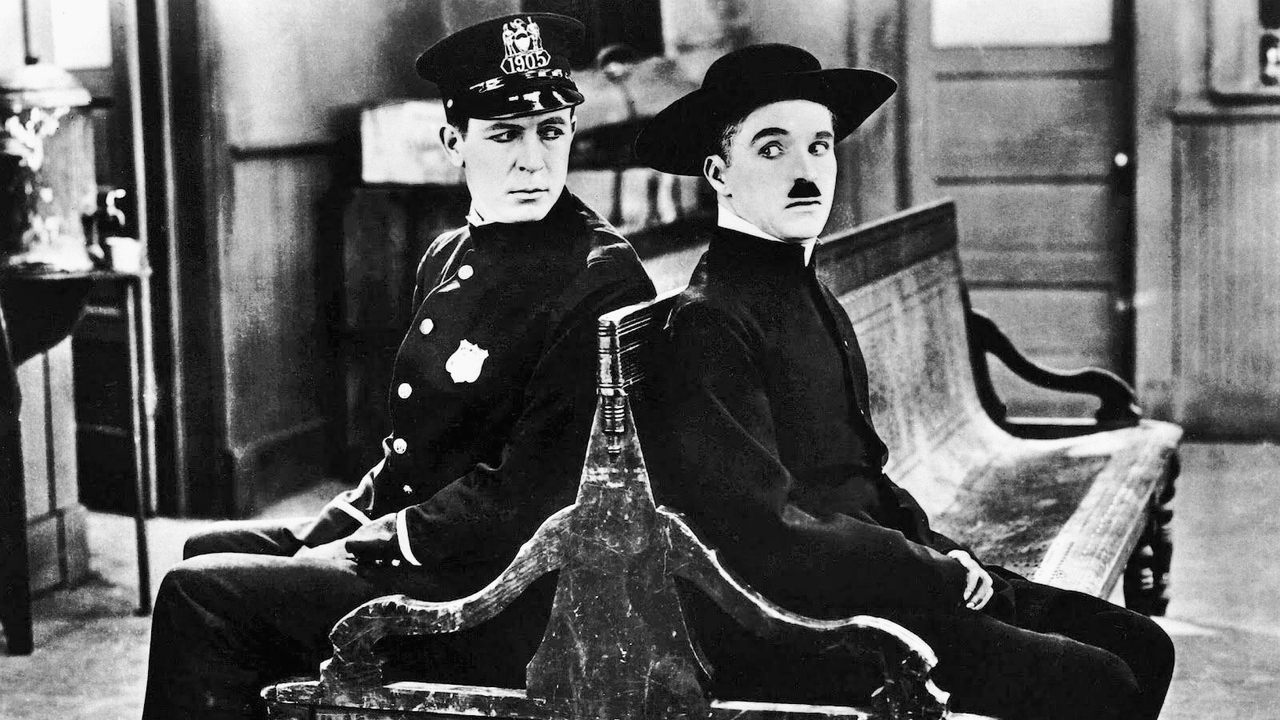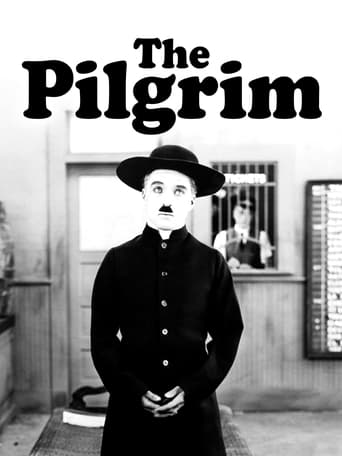



Thanks for the memories!
Such a frustrating disappointment
Dreadfully Boring
Great movie. Not sure what people expected but I found it highly entertaining.
View MoreCharlie Chaplin escapes from prison as he steals a preacher's clothes. There is a $1000 reward for him. A couple of elopers mistake him for the real thing and try to get him to marry them before the arrival of the father. He gets on the train. When it arrives at the Texas town of Devil's Gulch, he tries to surrender to Sheriff Bryan. Only the town was expecting the arrival of reverend Pim and the sheriff assumes that Charlie was their reverend. It turns out that the real Pim is delayed a week. He fakes a sermon and then he is recognized by an old cell mate.I didn't love the fake sermon or David and Goliath. Playing with the kid is loads of fun. That part is so reminiscent of 'The Kid' including having Edna Purviance around. The kid eating the frosting off the hat hit me hard on the funny bone. That's the part I love the best.
View More1923's "The Pilgrim" put an end to a significant chapter of Chaplin's career. It was the last silent short film he did after his career centered around these for almost a decade, easily the most prolific phase of his life. In the 20 years afterward, he directed all his notable full feature films he is most know for these days. With "The Pilgrim", Chaplin surely went out on a high note. It's one of his longest short films and also the last one with his long-time partner Edna Purviance. It was almost too long for his own good. He never really managed the perfect balance between drama and comedy here, one of the strongest achievements in his feature films. It occasionally drags, but all in all it's not bad. Of course it has its moments, like Chaplin looking at the girl and then in his very own shy fashion into the camera when he's going through albums with the old lady. The flower-picking ending is truly hilarious as well. And there's quite some significance to the ending about Charlie and film entering new territories (Mexico) with the rising significance of sound. Decent job from everybody involved and it's even better if you watch the restored version including Matt Munro's beautiful rendition of "Bound for Texas" and a pretty good score beyond that too.
View MoreThe tramp escapes from prison and, with wanted posters everywhere, takes a train to a place picked randomly Texas. Disguised as a minister he is fortune enough to be mistaken for the real deal when he stumbles into a welcoming party for a town's new minister, Reverend Phillip Pin. A mixed blessing this as it puts more pressure on his disguise and makes it even more important he cover up the telltale signs of a life spent behind bars.As part of my recent film education I have been watching quite a few Chaplin films of this period as Sky have been showing them as a season over the last few weeks and what I have found is what everyone already knows which is that the enduring popularity of Chaplin is not a fluke or accident. No, The Pilgrim yet again demonstrates the talent and skill that Chaplin had because it is very funny, imaginative and well put together. The story is simply and allows for a series of scenarios where Chaplin can work his comedy such as the hat becoming part of the pudding, the early confused chase and so on. However in the smaller moments you can also see plenty of evidence of talent; my favourite moments of the film are the frequent bits of habitual behaviour that betray the tramp as a convict. Having bought a ticket for the train he then climbs under the car because he is not aware of any other way of doing it, or while buying the ticket he leans against the bar as one would in a cage. Little things like this running along with the bigger scenarios make the film that much funnier for having a consistency to it.In front of the camera Chaplin delivers perfectly. I have yet to get into his later films (although I will do) but I will be interested to see how he acts when he has the ability to deliver dialogue with sound. The reason for this is that silent film acting is much different from dialogue driven because near everything has to be done with body language and gestures; goes without saying that he is great at it. He is well supported by a cast getting familiar to me after seeing several of his shorts and the turns from Swain, Purviance, Underwood and others are good.Overall then another classic comedy from Chaplin that is consistently funny due to the bigger laughs blended with lots of clever amusing detail.
View MoreI regret giving THE PILGRIM a "9". It is so well done it deserves a "10" but one so wishes it had more scenes to it one's disappointment makes it lesser than say THE GOLD RUSH or CITY LIGHTS or MODERN TIMES.Chaplin was trying to get away from his classic tramp figure, but public love of the character forced him to use it in his last four major silent films as well as traces of it in his first sound film THE GREAT DICTATOR. Yet in the middle years of the 1920s he considered projects avoiding the tramp entirely. He would make Edna Purviance's A WOMAN OF Paris as director, and played a cameo as a porter. He would consider a variant on the tramp "Professor Bosco" who had a flea circus (the sequence from this film survives in the anthology THE UNKNONW CHAPLIN). He would even consider a film on the life of Napoleon (a still of him dressed as Napoleon exists - the resemblance is uncanny). Finally there was this, the one feature he did prior to his sound period where he really isn't the tramp. But he's close.Chaplin is a convict who manages to break out of prison. He heads for the Texas-Mexican border, and by circumstances he is dressed as a clergyman (hence the title). It is odd that Charlie never delved into the field of religion before. He believed in the Judeo-Christian code of ethics, but was basically indifferent to organized religion (a point used against him as a "godless atheist" by his right-wing critics from the 1930s onward). Occasionally he shows a minister in one of his comedies. In EASY STREET he is partly convinced to reform and join the police by a minister at a mission house (whom is glad to see the success of his sermon, but is shocked when Charlie turns over the collections plate and some other items he pinched). But no full scale film emerged - possibly due to Chaplin the businessman thinking shrewdly ahead about box office results. The 1920s was not only the age of bathtub gin, Al Capone, the discovery of Freud, the kicking up the traces of the Victorian period...it was also the time of the reemergence of the K.K.K., the beginning of such figures like Aimee Semper McPherson among Christian religious leaders, the Scopes Monkey Trial in Tennessee. The Religious Right was very much alive in the 1920s, and while they loved Charlie's tramp they would have scowled at a serious spoof on religious leaders. Two years after the film Sinclair Lewis did just that in ELMER GANTRY, which won the Pulitzer Prize (Lewis refused it for personal reasons). Although a best seller, GANTRY did not get made into a film until the 1960s.Charlie arrives in a small town in Texas, close to that border he wants to cross. Once across in Mexico he'll be safe. He is met at the station by a group of church elders led by Matt Swain. They have been expecting the new minister, and they think it is Charlie. As the town Sheriff (Tom Murray) is with them Charlie can't disavow them of their error without causing further questions being asked. He goes along hoping to find an opportunity to flee before long. Of course one complication after another arises testing his abilities to maintain his role. The most critical one is the appearance of a fellow jail bird (Charles Reisner) who blackmails Charlie into assisting him in robbing the Church or face exposure. Charlie goes along - or does he?From being an opportunistic crook, Charlie's performance is wonderful in showing how sometimes a person's new role brings out values he or she never realized existed (think of party boss Chester Arthur made President of the U.S. by the assassination of his predecessor in 1881, and subsequently showing a zeal for reform in Civil Service, Naval Construction, and vetoing pork-barrel legislation that nobody ever thought he had in him). Here Charlie the opportunist did think of using Church money to defray expenses in Mexico, but gradually he gets to take his role very seriously. First time he does is a cute little joke about the collection plates. There are two boxes passed around by Swain and the other elders (the congregation is large and divided into right and left sections of the pews). Chaplin is watching the congregation, but notices more activity on one side than the other. The boxes are given to him for safe-keeping. He feels the heaviness of the well-filled box and smiles beatifically at that portion of the congregation. Then he sees how light the other one is. He gives the other side a dirty look!He turns out to be a very effective preacher, delivering a sermon on David and Goliath. Done in pantomime it is one of the best bits he ever concocted, managing to show the story without having to speak at all. He never forgets he's a comic, and the final bit in the sermon after the death of Goliath (when he shows David's disposal of the corpse) is a typical "tramp" gesture with his foot.There are other bits in the story that are worth treasuring. Swain (shortly to get his great role in Chaplin's films in THE GOLD RUSH) shows for all his marked piety a degree of failing in his drinking. His and Charlie's discomfiture regarding a side flask (keep in mind an illegal one - it's Prohibition in 1923 America!) is cleverly handled.The others in the film are quite good - particularly Murray who proves to be one lawman with a human heart. And the conclusion, wherein Charlie wonders if his idea of escape was so really smart is clever too. THE PILGRIM is not the top tier Chaplin, but is wonderful enough as it is - and well worth viewing when one can.
View More